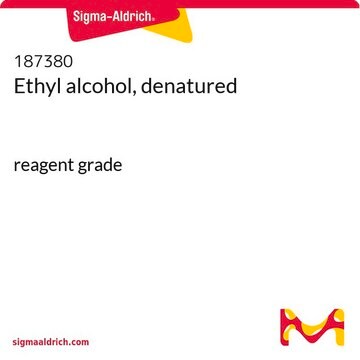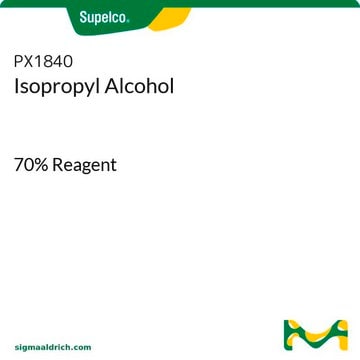793213
Reagent Alcohol
70%
Synonym(s):
Ethanol, Ethyl alcohol, EtOH
About This Item
Recommended Products
vapor density
1.59 (vs air)
Quality Level
form
liquid
expl. lim.
3.1-27.7 % (lit.)
concentration
70%
bp
78 °C (lit.)
mp
-114 °C (lit.)
Tax and license information
Sales restrictions may apply
Looking for similar products? Visit Product Comparison Guide
Application
- The SELEX (Systematic Evolution of Ligands by Exponential Enrichment) procedure for the selection of aptamers.
- The study of the morphology of mitochondria in dopaminergic neurites of mice.
Packaging
12x1GA-PB is 3x(4x1GA) in poly bottle.
20x1GA-PB is 5x(4x1GA) in poly bottle.
Components
Other Notes
The letterhead approval is not required by Sigma-Aldrich for the 4x1GA unit size.
Link to Letterhead Example:
replacement part
Signal Word
Danger
Hazard Statements
Precautionary Statements
Hazard Classifications
Eye Irrit. 2 - Flam. Liq. 2 - STOT SE 2
Target Organs
Eyes,Central nervous system
Storage Class Code
3 - Flammable liquids
WGK
WGK 2
Flash Point(F)
60.8 °F - closed cup
Flash Point(C)
16 °C - closed cup
Choose from one of the most recent versions:
Already Own This Product?
Find documentation for the products that you have recently purchased in the Document Library.
Articles
Cell counting protocol using a hemocytometer for monitoring cell viability. Discover other cell counting tools such as the Scepter™ 3.0 Cell Counter.
Overview on how to maintain proper cell culture laboratory safety including steps on performing lab risk assessments, surface disinfection, biohazard and waste removal. Free ECACC handbook download.
Protocols
Cell culture protocol for proper aseptic technique to maintain a sterile environment and to prevent cell culture contamination. Free ECACC handbook download.
Cell culture protocol for passaging and splitting adherent cell lines using trypsin EDTA. Free ECACC handbook download.
Cell culture protocol for high cell viability freezing using cryopreservation reagents like DMSO. Free handbook download.
Step-by-step stem cell culture protocols for human induced pluripotent stem cells (iPSCs) including ips cell thawing, expanding, freezing and characterizing.
Our team of scientists has experience in all areas of research including Life Science, Material Science, Chemical Synthesis, Chromatography, Analytical and many others.
Contact Technical Service









